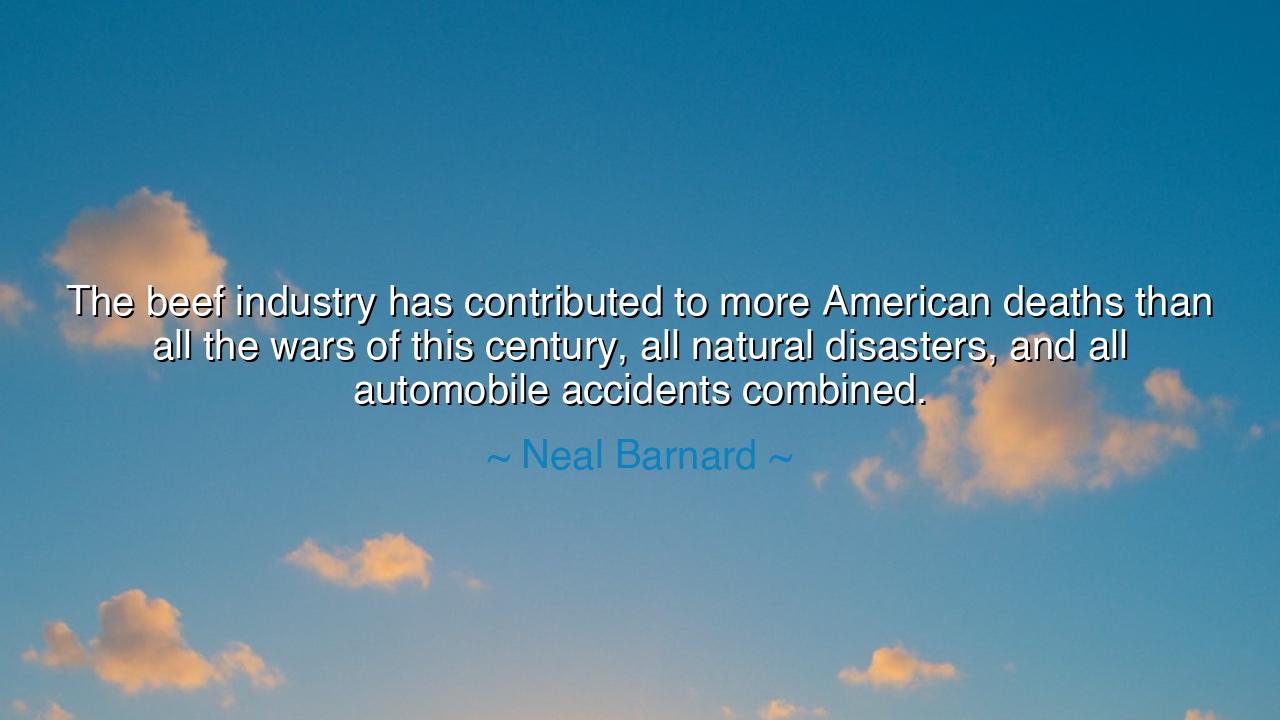
The beef industry has contributed to more American deaths than
The beef industry has contributed to more American deaths than all the wars of this century, all natural disasters, and all automobile accidents combined.






Neal Barnard, physician and prophet of health, once declared with thunderous gravity: “The beef industry has contributed to more American deaths than all the wars of this century, all natural disasters, and all automobile accidents combined.” In this utterance, he unveiled a truth that pierces beyond battlefields and storms: that the slow poisons of diet, masked in comfort and tradition, have slain more silently than cannon, flood, or fire. For Barnard saw not only the bodies lost in war, but the millions cut down by heart disease, stroke, and cancer—foes nurtured at the table rather than upon the field.
The origin of this cry lies in Barnard’s work as founder of the Physicians Committee for Responsible Medicine. He stood against the giants of the beef industry, who clothed their trade in patriotism, prosperity, and culture. Yet behind their banners lay diets heavy with saturated fat and cholesterol, linked to the very diseases that claimed untold lives. In his comparison, Barnard sought to awaken the people with stark clarity: that the greatest enemy may not wear a uniform or descend as a storm, but arrive daily on the plate, disguised as nourishment.
History itself provides echoes of such hidden killers. In the 19th century, cholera crept through contaminated water, striking more cruelly than any army. It was not recognized as an enemy until reformers revealed its source. So too with the beef-heavy diets of the modern age: celebrated in feasts and holidays, yet silently laying waste to health. Barnard’s words cry out that recognition itself is the first step to survival—that one must name the danger before one can conquer it.
Consider the fate of nations at war. World War II consumed hundreds of thousands of American lives. Yet every year, diseases linked to poor diet take far more. A single century of such eating, Barnard reminds us, eclipses all the carnage of wars and disasters combined. Here is the deeper sting of his words: that what we accept as ordinary may be deadlier than what we most fear.
Therefore, O seekers of wisdom, let this lesson be etched in your hearts. Wars and storms may strike for a season, but daily choices endure for a lifetime. The true battle is not always upon the battlefield, but in the quiet kitchens of our homes. Barnard’s words are not only warning, but call to arms: to reclaim health, to confront industries that profit from disease, and to choose life over slow destruction. For the greatest act of patriotism may not be to march with a flag, but to preserve the strength of the body and the spirit against the enemies we invite to our own tables.






ATPhuong Anh Trinh
The idea that beef consumption could contribute to more deaths than all the wars and disasters combined is a shocking thought. But does this comparison oversimplify the problem? While the beef industry certainly has health consequences, could focusing on this issue detract from addressing other major contributors to poor health, like smoking, lack of physical activity, or alcohol consumption? Is the beef industry being unfairly scapegoated, or is this a serious public health crisis?
MManh
Barnard’s statement is a powerful critique of the beef industry’s role in public health. But is it too simplistic to blame one industry for so many deaths? Could the underlying issue be more complex—perhaps involving other lifestyle factors such as lack of exercise, processed foods, or environmental toxins? How do we take responsibility for our own health choices while also acknowledging the impact of industries like the beef sector?
MQChu thanh minh quy
This quote definitely brings attention to the negative impact of beef on health, but can we really compare it to the death toll of wars or natural disasters? It seems like Barnard is pointing out a hidden crisis—one that’s not as visible as those other causes. How can we balance this reality with the fact that beef is so ingrained in American culture? Is it too radical to expect major dietary shifts, or is this something we need to confront for the sake of public health?
CTTran Thi Cam Tien
Barnard’s quote raises an important and uncomfortable point about the role of the beef industry in public health. It seems like the meat industry has a far-reaching impact on not just individual health, but the broader healthcare system. Could a shift away from beef consumption significantly reduce these numbers? What would it take for people to re-evaluate the health risks of eating beef on a regular basis, especially when other dietary alternatives exist?
SPSon Pham
Neal Barnard’s statement about the beef industry is certainly alarming and puts into perspective how food choices can have a massive impact on health. But is it possible that this statistic exaggerates the link between beef consumption and deaths? What kind of data is being used to support this claim, and can we truly attribute so many deaths directly to the beef industry, or is it more about a broader pattern of unhealthy lifestyle choices?